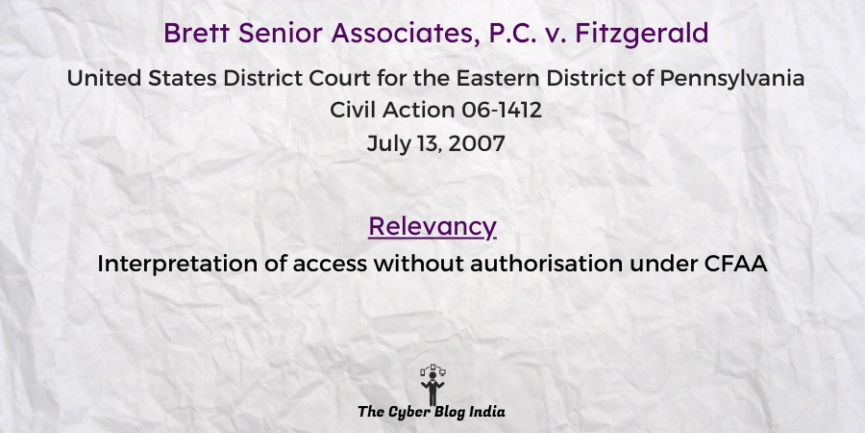Brett Senior Associates, P.C. v. Fitzgerald

Brett Senior Associates, P.C. v. Fitzgerald
In the United States District Court for the Eastern District of Pennsylvania
Civil Action 06-1412
Before District Judge Mary McLaughlin
Decided on July 13, 2007
Relevancy of the Case: Interpretation of access without authorisation under CFAA
Statutes and Provisions Involved
- The Pennsylvania Uniform Trade Secrets Act, 12 P.S. § 5302
- The Computer Fraud and Abuse Act, 18 U.S.C. § 1030
Relevant Facts of the Case
- The plaintiff hired the defendant in 1989 for tax, accounting, and financial services. At the time of joining, he did not sign an employment agreement.
- In 1998, the plaintiff restructured its business and required the employees to sign confidentiality agreements.
- In 2005, he had a job interview with the representatives of Fesnak, a firm providing tax and accounting services.
- In November 2005, he informed the plaintiff of his employment at Fesnak and started to prepare for his departure. During his employment with the plaintiff, he serviced a total of 69 clients.
- He contacted approximately 20 clients and asked them to move with him to Fesnak. 15 of them actually did so.
- Before his departure, he made copies of certain information about the plaintiff’s clients. He also emailed engagement letters and financial statements of four clients to Fesnak.
- The plaintiff has claimed that the defendants violated CFAA, and misappropriated its confidential business information, and trade secrets.
Prominent Arguments by the Counsels
- The plaintiff’s counsel argued that the defendant violated CFAA by accessing the plaintiff’s computer system to transfer its files to Fesnak for improper use. The defendant misappropriated its trade secrets in violation of the Pennsylvania Uniform Trade Secrets Act. The client list enabled the defendant to lure the plaintiff’s clients away to Fesnak.
Opinion of the Bench
- The plaintiff had provided the defendant with full access to its computer system. The plaintiff’s CFAA claim would fail as there is no allegation that the defendant lacked the authority to view any information in the plaintiff’s computer system. He had lawful access.
- The information in the client list does not come under trade secret protection. A compiled list of clients is not proprietary in nature.
Final Decision
- The court granted the defendant’s motion for summary judgment.
Anjali Agrawal, an undergraduate student at the NALSAR University of Law, prepared this case summary during her internship with The Cyber Blog India in May/June 2022.
